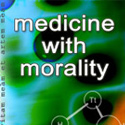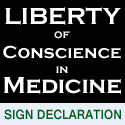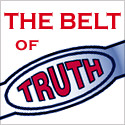Euthanasia in the Context of the Imago Dei and Human Destiny
Embrace the Grace: Learning to be a Gift of Self.
New Norcia, December 2006.
In JRRTolkien’s The Return of the King, Gandalf describes how the Stewards of Gondor are given responsibility for rule until the king has come. The steward of the time fails that responsibility miserably. In the face of oncoming danger he gives up and seeks to drag others down with him.
In the Beginning God created the heavens and the earth. And we read in those opening words of Genesis that God created man in His Image. Male and female created He them. And God said “be fruitful and increase, fill the earth and subdue it; rule over every living creature.” God establishes order and mankind is given the responsibility to see order is done.
In these few words we have the basis of all that we are, all we have, and all that we must do until the King returns. We are created in the Image of God. This brings with it a consciousness of God’s Law which is present in all people even though sometimes it is barely evident. All our creativity, all our ability to love, to rule with justice mixed with mercy is dependent on us having been created in His Image. We are given freedom, but in this freedom we are to be responsible stewards and that means there are limits to this freedom.
21st Century biotechnology has highlighted for us in a new way questions that demand answers, answers that the people of God must ensure are consistent with the limits that God has imposed for our own good and the future of humankind.
What does it mean to be human?
What does it mean to have a soul?
Does all human life have intrinsic value?
Can we make decisions as to which lives are worthy to be lived?
When does life begin?
What is mankind’s role in making life, taking life and ultimately faking life?
Are we any different to the animals?
These questions underline the clash of worldview between humanism and Christianity, what it means to be stewards of creation, and what it means to be a Christian in a hostile culture.
Featured on Starbuck’s take-away coffee cups this year was the following by Wesley J. Smith
The morality of the 21st century will depend on how we respond to this simple but profound question:
Does every human life have equal moral value simply and merely because it is human?
Answer yes, and we have a chance of achieving universal human rights.
Answer no, and it means that we are merely another animal in the forest.
As a result of the battles of the last few years the focus has once again been sharpened. The destructive embryo research battle was seen to be only one bridge in the deeper and fundamental issue of what it means to be human being also relevant to designer babies, cloning, eugenics and euthanasia. The blurring of what it means to be human represents the rebellion against what it means to be created in the Image of God, man’s ultimate push to be free of the Creator God, to render Him unnecessary and be our own gods.
Our own Aussie expatriate Peter Singer, Professor of Ethics at Princeton University – unbelievably a world-renowned Catholic institution, is perceptive enough to understand where the battle line is. Talking about the relative value of human life compared with animal life he said in a recent interview:
Major religions, particularly Judeo-Christianity in the West, are responsible for society’s mistaken belief in the sanctity of human life and that the life of all humans should be considered as superior to that of any animal, Singer, an atheist, says. “The major religions are an obstacle because they teach that humans alone are made in the image of God, humans alone have an immortal soul, God gave us dominion over the animals, and those ideas are an obstacle to treating the animals as we may treat humans.”
We live in a society that is in danger of losing its soul, a society in which we have forgotten how to shudder, an advancing culture of death. We have an obligation to actively promote a Culture of Life. Today we’re just going to concentrate on the euthanasia battle but this inevitably brings in infanticide as well.
At root, the euthanasia debate is about autonomy. The cry for abortion centres on we want control over our bodies; the cloning debate hinges onbut we want to do this research anyway, even if it is not necessary and even if it is wrong; the call for Advance Care Directives (before WA State Government at the present time) and euthanasia is ultimately about we want to choose when we die, not just when life is near its natural end but at any other time we choose as well. It is a “we want” battle to the exclusion of any consideration of moral law or the soul. It is in opposition to what we are considering in this conference of gifting ourselves to God.
It highlights the fundamental battle of our attitude to God: do we do things our own way or do we do things God’s way; are we people who say to God “your will be done” or does God say to us “your will be done”.
It is symptomatic of our rebellion – as in the Garden of Eden to be our own gods and at the Tower of Babel that nothing will be impossible for us. We will make life when we want, we will fake it when we want, and we will take it when we want. What we fail to realise is that achieving personal autonomy will inevitably lead to a denial of the soul and a loss of the control we so desire.
As Scott Peck writes in The Denial of the Soul:
‘…advocates of euthanasia on demand… fail to realise… that the achievement of their ends would quite possibly create a society even more soulless and mechanistic than the one we have now… a society where there is no potential glory in dying, an utterly rational society where people are simply put to sleep upon request without any reference to the irrational mystery of their souls or to God who is their source and that of all true glory.’ (p228.)
And as CSLewis writes in The Abolition of Man, a record of three lectures given in 1943
…It is the magician’s bargain: give up our soul, get power in return. But once our souls, that is, our selves, have been given up, the power thus conferred will not belong to us. We shall in fact be the slaves and puppets of that to which we have given our souls… if man chooses to treat himself as raw material, raw material he will be: not raw material to be manipulated, as he fondly imagined, by himself, but by mere appetite, that is, mere Nature, in the person of his dehumanised Conditioners. (p 78-80 in my Touchstone edition)
Gifting of ourselves, that is the proper attitude of submission to God in the context of whether we live or die, is illustrated by the apostle Paul in his letter to the church at Philippi 1:20
I eagerly expect and hope that I will in no way be ashamed, but will have sufficient courage so that now as always Christ will be exalted in my body, whether by life or by death. For to me, to live is Christ and to die is gain. If I am to go on living in the body, this will mean fruitful labor for me. Yet what shall I choose? I do not know! I am torn between the two: I desire to depart and be with Christ, which is better by far; but it is more necessary for you that I remain in the body. Convinced of this, I know that I will remain, and I will continue with all of you for your progress and joy in the faith, so that through my being with you again your joy in Christ Jesus will overflow on account of me.
Job, in the midst of his pain and distress also illustrates this submission
Why is light given to those in misery,
and life to the bitter of soul,
to those who long for death that does not come,
who search for it more than for hidden treasure (3:20-21)
Oh, that I might have my request,
that God would grant what I hope for,
that God would be willing to crush me,
to let loose his hand and cut me off!
Then I would still have this consolation–
my joy in unrelenting pain–
that I had not denied the words of the Holy One. (6:8-10)
(neither in my life until now, nor now)
and there is no intent whatever to take things into his own hands – indeed exactly the opposite.
Now I seem to be repeating myself with these themes. We have been embroiled in the cloning debate and it became more obvious we could make the points simply for those who were prepared to listen: Cloning is wrong, cloning is unnecessary, cloning is bad for society. We can say the same here: Euthanasia is wrong, euthanasia is unnecessary, euthanasia is bad for society.
Euthanasia is wrong however you look at it.
It is wrong from a theological point of view.
It is unnecessary from a medical point of view.
And it has huge consequences for society.
It will be impossible to hold boundaries.
It undermines confidence in medicine.
It creates the problem of the duty to die.
It raises the Nazi Germany spectre of which lives are worthy to be lived.
Economic rationalism will finally determine its descent into the slippery slope.
As in all the other battles involving what it means to be human, the truth is distorted and deliberate lying takes place to disguise the real issues in euthanasia.
Because of this I actually prefer not to use the terms of euthanasia and passive euthanasia. In the context of a terminal phase of a terminal illness– meaning where the natural process of death is both imminent and inevitable – let us be clear and differentiate between
1. purposeful killing: a deliberate interference in the natural process (e.g. injection in a definite lethal dose) with the object and certainty of death which would otherwise not take place at that time or as soon as desired by the person or those responsible for that person. This is what is commonly called euthanasia and is illegal.
2. withdrawal of futile medical treatment: a withdrawal of an interference in the natural process that may or may not result in acceleration of death that is deemed to be inevitable and imminent. This is sometimes called ‘passive euthanasia’ but this is misleading as it is a normal part of good medical care and is legal.
3. relief of pain and distress: the administration of normaldoses of narcotic medication that may inadvertently hasten thenatural process of death when such is inevitable and imminent. This also is legal and a part of good medical care.
It is commonly argued by proponents of euthanasia that there is no difference between the above three actions and that ‘the method used is not in itself important’ and ‘the consequence is the same.’ This argument is clearly flawed when considered in the light of the descriptions of these distinct processes, two of which represent good medical care and are legal.
.
I have looked after dying people in their homes now for 35+ years. I know what it is like. I know what we can do – no one need die in pain.
I have compassion for those who are dying and who want euthanasia but compassion is not enough. Compassionate care will help them get past that desire through to a point of acceptance. The option of very good palliative care in this country makes euthanasia unnecessary. Relief from pain and distress is achievable and obtainable. We must not bow to economic pressure to reduce these services and for them to be less obtainable. We must not allow the cheaper option of euthanasia to ever become an easy ‘reason’ to adopt that course of action. We can and we must ensure quality of care until death’s natural end.
It is argued that legalising euthanasia is only giving an option to those who have no belief in a higher (spiritual) authority and who wish to choose the time and nature of their death and that that option should be given them. But, quite apart from the obvious moral dilemma in introducing legislation that permits a wrong in order to give legal ‘approval’ for those who wish to choose that wrong, there are extreme dangers that make euthanasia not only morally wrong but also logically tragic for the future of our society so that it is no longer a safe place in which to bring up our children.
Firstly, there is the pressure on the dying (or, in the future, the infirm or handicapped) to ask for or consent to be euthanased even when they want to keep on living – the so-called duty to die – in order to relieve emotional, physical or financial distress on relatives or carers involved.
One of the arguments commonly expressed for euthanasia is for the sufferer to be put out of their misery. In truth this is more usually a cry by the observer and more accurately expressed as “put them out of my misery” while the patient is not in a hurry to die or drifting in and out of unconsciousness. So, in a culture that expects people to die, the patient starts to think “I should agree to be killed so I can put them out of their misery.”
Secondly, the euthanasia option solves a financial problem for government in the provision of facilities and personnel for palliative care. Politicians faced with deficit budgets and an increasing bill for palliative care are likely to opt for legalisation of euthanasia as a way of limiting and even cutting funding for palliative care. This can already be seen in Holland which has recently legalised euthanasia after practicing it for many years and which has an extremely low ratio of palliative care beds per population compared with Australia and England.
So the duty to die can also reflect a ‘state’ obligation as well as to relatives. Try to imagine the pressure put on an elderly infirm person in a hostile environment with an expectation that they will agree to be killed because it is better for society.
Thirdly, there is the reality of the ‘slippery slope‘ with
– blurring of the boundaries between voluntary and involuntary euthanasia e.g. as in Holland with roughly 20% of euthanased people being killed without their consent.
– extending the terminal phase of a terminal illness to include longer time intervals (e.g. months or years) before inevitable death
– extending the definition of illness to include non-terminal illness e.g. depression
– introducing the concept of a life not worthy to be lived and then include the handicapped or infirm
There is no room for people to think this can’t happen, the obvious current example being the way parliament has back-flipped on cloning in just four years. The devaluation of human life is slipping precipitously.
Fourthly, perception by the patient of ambiguity in the role of the treating doctor inevitably leads to uncertainty and fear. Patients may justifiably think that doctors might be less enthusiastic in their care if they think the patient should be prepared to die and are supported in this view by society and the law. Dualism in the doctor’s role must inevitably lead to confusion and fear with patients wondering whether their doctor’s attitude might change somewhere along the line of care.
It is wrong to kill. It is especially wrong to kill those for whom we have been given a mandate of care – the vulnerable. It is even more wrong for doctors to be involved in that killing. It is for very good reason that the Hippocratic Oath states that I will give no deadly medicine to any one if asked. Similarly, a great dictum of medicine is First, do no Harm and is also from Hippocrates: Primum non Nocere.
The euthanasia lobby is not content – and will not be content – with euthanasia just for the terminal phase of a terminal illness. They want to extend the time before death to a time of their choosing – months or years depending on the disease – and they want to extend the definition of illness to include treatable diseases and even depression and that is just such a wrong model for society and for our young people. It adds to the philosophy already around if things get too hard, I’ll just kill myself.
It is essential to uphold the intrinsic value of all human life in all states of vulnerability, disability and dependency from fertilisation to its natural end in accord with our view of what it means to be created in the Image of God. This is the theme of Choose Life Australia.
Secular humanism with its denial of the soul and of God is rampant. This is due in part to the failure of God’s people to be a passionate people of God, to proclaim the great truth of God as Creator and Redeemer, that the Son of God came to save us, that He came as the baby of Bethlehem, that He died on the cross at Calvary, will come again in glory, that we are His creation, His creatures, and that if we give ourselves to Him we will share in that glory, that there is a city to come – and all of this means we have great reason to celebrate.
It was in observing the Children of Israel camped in their tents before entering the Promised Land that Baalam, having been commanded by Balak to curse them, could only speak the words that God gave him to speak and blessed them: The LORD their God is with them; the shout of the King is among them (Numbers 23:21). What a glorious observation that was.
Now is the time to establish more firmly our identity as children of the King; we are Citizens of Heaven; we are Kingdom People. We have a Story and a Message to tell especially at Christmas. As we celebrate this Christmas – as celebrate we must – let us boldly speak for truth in the public square. Now is the time not only for a strong Christian Voice and to be a distinctive people of God, but to have the Shout of the King among us – Emmanuel, God with us. It is time to be heard. Until the return of the King.
Lachlan Dunjey. December 2006.






